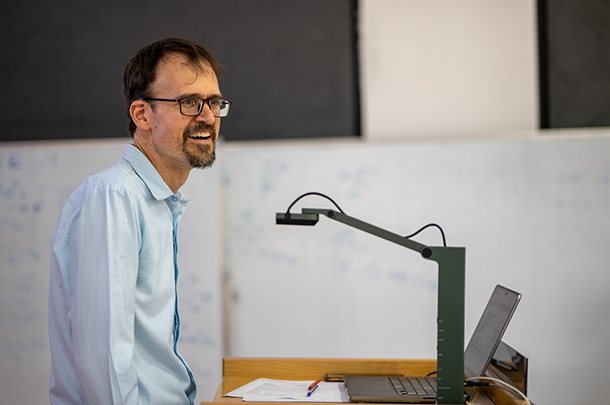Energy course continuum: a CMU-Africa and Pittsburgh collaboration
Hope Reveche
Apr 13, 2023
Students at CMU-Africa and CMU-Pittsburgh have the opportunity to enroll in a unique continuum of classes instructed by Barry Rawn, associate teaching professor of electrical and computer engineering, and his colleagues Sarath Tennakoon, Paulina Jaramillo, and visiting professor Rebekah Shirley of the World Resources Institute. Taught in a hybrid setting, the eleven energy courses focus on the fundamentals of energy systems and prepare students for designing these systems in different contexts.
Learners cover material that not only goes in-depth about the technology required to create such models but also discusses broader applications in the industry. An example of one of these courses is Energy Project Development and Economic Studies where students use case studies in contexts from around the world to learn about the techno-economic factors that make a project feasible. The semester culminates in a self-directed, final energy project, which is critiqued by peers and presented.
"After students have chosen their projects, we cluster them in groups and we have them read each other's work and give each other feedback. So, I think that's the place where the most collaboration happens," Rawn says.
This review process allows for critical thinking in technical, social, and financial aspects as well as gives the Kigali students and Pittsburgh students the opportunity to learn from each other. "The diversity of learners in the class means that every year our group benefits from so many perspectives: industrial, agricultural, rural, and urban," Rawn comments.

Rawn teaching students in Kigali and Pittsburgh in his hybrid course
One challenge Rawn has witnessed with the nature of the hybrid course is integrating a "hands-on" component of these projects. Experimental capabilities are limited as both sections are unable to participate together in person.
Still, Rawn and his colleagues find ways to keep the courses engaging such as bringing in guest lecturers to talk about topics that pertain to students' projects and inspire onward career planning. Additionally, the hybrid environment allows learners from different backgrounds to raise questions that give new perspectives to these projects. "You get diverse questions that pop up. Either side might not have familiarity with something, and so sometimes a student might realize, 'This is a question for someone else, not for me, because I'm from this context.' But then in other cases, students will have stronger or weaker backgrounds. And so, they'll help each other," Rawn says.
Bringing Pittsburgh and Kigali students together certainly enriches the learning experience.
Sarath Tennakoon, Visiting Professor, CMU-Africa
Tennakoon, who often teaches in the hybrid space at CMU-Africa, says that "bringing Pittsburgh and Kigali students together certainly enriches the learning experience. Pittsburgh students tend to be from many different countries and different programs, not just the College of Engineering. Kigali students are from different African countries, so they all have very different prior learning experiences which gives new perspectives during group discussions."
The students who have taken these courses go off into fields like the power sector, finance and project development, data analytics and consulting, and academia. Rawn encourages students from both CMU-Africa and CMU-Pittsburgh to stay in touch in order to inform relevant topics that should be taught to future students. "Our hope is that people go out, they get a related job, and then they come back and they tell us, 'Hey, this was useful, that wasn't.' Or, 'I was missing something that I could have used on the job, but that I had to hear about outside,'" Rawn says. This feedback then allows for adjustments to be made to create more topical content surrounding a broad range of systems.